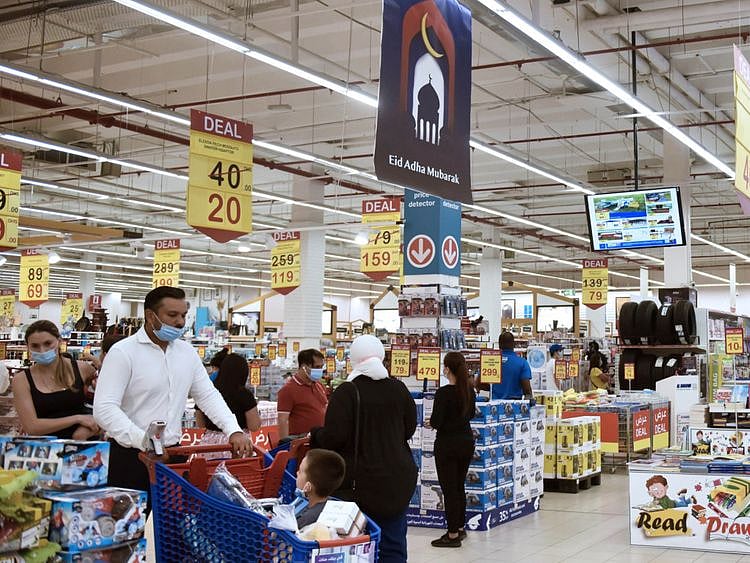Quieter Eid Al Adha a chance to reflect, say UAE residents
Many friends will not visit each other or go out, will instead spend time at home

Also In This Package
Dubai: UAE residents plan for a socially distant, more reflective Eid Al Adha in the time of COVID-19.
Missing will be the large gatherings of family and friends coming together to celebrate the annual “festival of sacrifice”, since close contact with many people spikes the risk of spreading the coronavirus.
Also Read
COVID -19: Dubai Summer Surprises gives families perfect reason to come together and enjoyIn pictures: UAE residents try their hands at fishing, get connected with natureInside Mohammed Bin Rashid Space Centre in Dubai : Moments ahead of the launch of the Hope ProbeA US firm is turning Arabian desert air into bottled waterGone too will be the customary hugs with loved ones and strangers alike that immediately follow the special early morning Eid prayer — which itself will not be held at mosques this Eid — as a precaution against the virus.
‘Subdued Eid’
For Mohammad Omar, a British expat in Dubai, the contrast between the last and this Eid will be sharp.
“Last time, we hosted 60 to 70 guests at our house on the first day of Eid. We also had some of my in-laws visiting and staying with us from abroad, for Eid. This time there will be no visitors or guests,” said Omar, 44, who works in the legal department of a large firm in Dubai.
“As you can imagine, Eid will be more subdued this time around. There won’t be the same size of feasts and sweets we had last time, and we won’t be going out as we did last time,” added Omar, who lives with his family in a Dubai villa.
‘You can’t let your guard down’
In Ajman, Pakistani expat Zubair Haider also plans to stay home this Eid. He won’t be visiting friends’ homes either. “There is a directive for not gathering, it is there for our own health and safety in these unprecedented times. You can’t let your guard down,” said Haider, 41, a marketing professional.
“It’s going to be a low-key, family-only Eid for us. We will probably go out in the evening, but stay in the car; get some treats for the kids. We’re not going to malls or restaurants this time.”
On-call
Hamdy Bahnasy, a senior public health and safety officer at Dubai Municipality, said he would be visiting friends while following the protocols and precautions.
“In one sense, it will be the same Eid for me and my family — we will still visit others to covey Eid greetings. But we will do it while keeping within the limits. We’re not going to, for example, contact elderly people. They are at greater risk from the virus and we want to keep them as safe us we can,” Bahnasy, who is from Egypt, added.
On the second day of Eid (Saturday), Bahnasy will be on-call. “It’s our duty at the municipality to keep everyone safe as much as we can, and I’m honoured to be part of it.”
Striking a balance
With fewer social commitments, there will be more time for a sometimes-neglected aspect of Eid — prayer and worship. Even though there won’t be Eid prayers at mosques, residents plan to start the day with the Eid prayer at home instead.
Following public health precautions is a religious duty for Muslims, as is celebrating Eid, and the two can — and should — go harmoniously together, said Khaleeq Ahmad Mufti, an Ajman-based Islamic scholar and author. “Celebrating Eid is an act of a virtue in Islam. Obeying social distancing norms in these times of a serious pandemic, in the interest of everyone’s safety, is also a duty for Muslims. Therefore, it is also a virtue in Islam,” said Mufti, a familiar face on Sharjah TV as a host of an Islamic programme. “Be happy, celebrate; and be responsible.”
He said a quieter Eid is an opportunity for Muslims to share Islamic stories and values with the whole family.
“You can make beneficial use of the more free time to explain to your children, for example, about things like, what is Eid? It is the festival of sacrifice, not only of the sacrificial animal in gratitude to Allah, but also of our baser qualities,” Mufti added.
Sign up for the Daily Briefing
Get the latest news and updates straight to your inbox
Network Links
GN StoreDownload our app
© Al Nisr Publishing LLC 2026. All rights reserved.